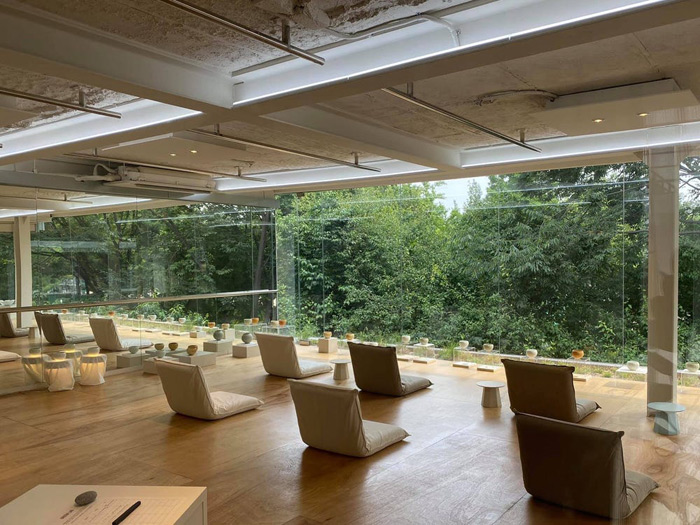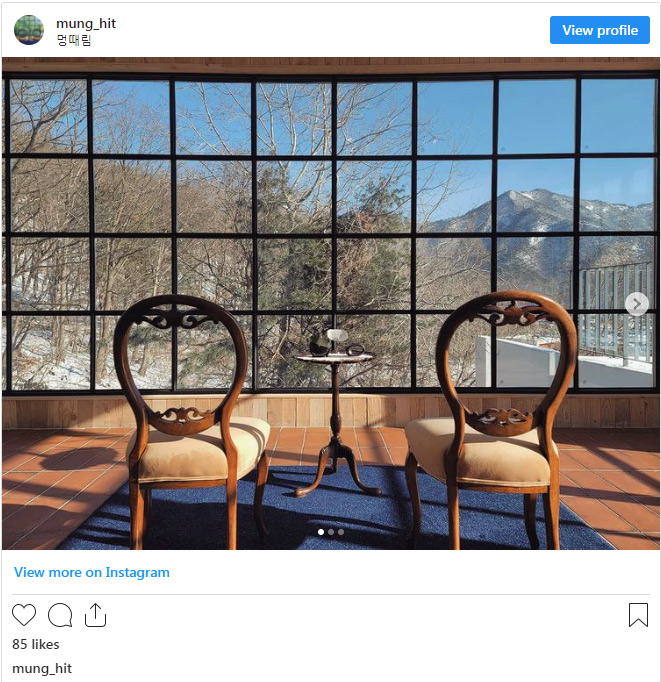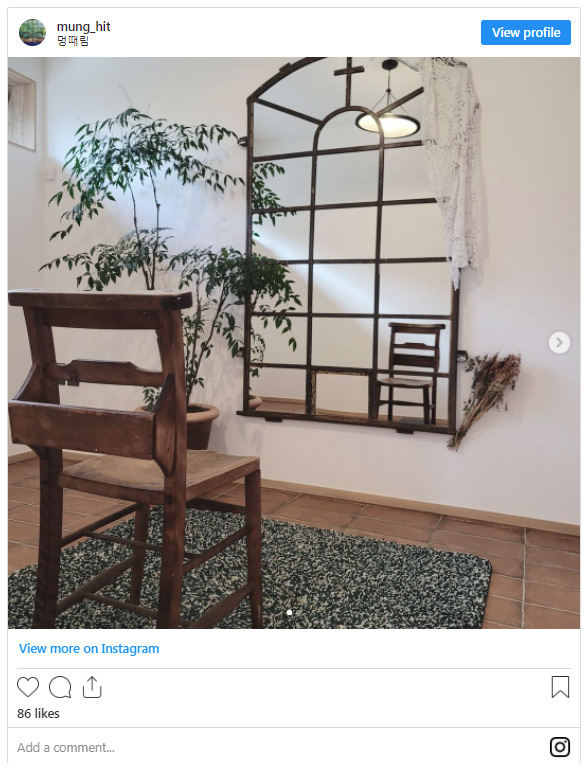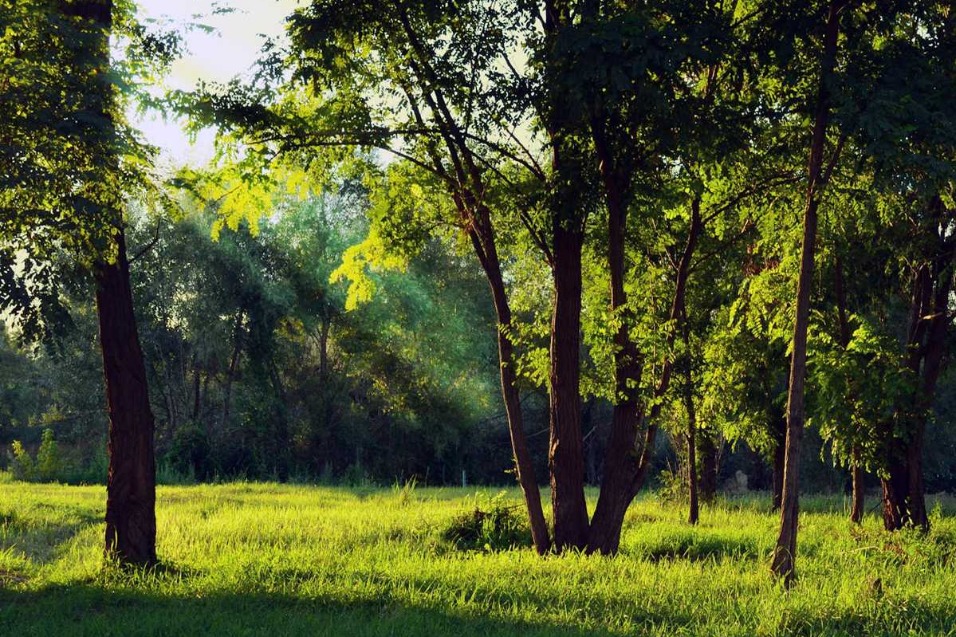疫情反復壓力大 韓國人只想找個地方“發呆” 'Hitting mung’: In stressed-out South Korea, people are paying to stare at clouds and trees
中國日報網 2021-12-07 16:34

韓國近日的一項調查發現,70%的韓國人坦言壓力很大。疫情持久戰、債臺高筑、買不起房,再加上快節奏的生活,讓許多韓國人只想找個地方靜一靜。或者是到一個茶館呆著,什么也不做,或者是看一場畫面單一沒有情節的電影。放空,成為韓國人治愈自己的流行方式。

Tucked away in a side street near an urban park named Seoul Forest is a tea shop that barely seats 10. Here, you can’t talk. Your phone must be on silent. No shoes allowed.
首爾森林城市公園附近的一條小巷中有一家茶館,里面只能容納10個人。在這里,不能講話。手機必須靜音。不能穿鞋進去。
The rules have one aim. Relax. Just space out.
這些規則都有一個目標:放松,讓自己放空。
As South Koreans enter the living-with-corona phase of the pandemic, some are easing back into social life by visiting public spaces where they can be alone and do very little. Nothing is the new something in South Korea as people desperately seek refuge from the pressures of living as functioning adults in a global pandemic in a high-stress and fast-paced society with soaring real estate prices and often-grueling work schedules.
隨著韓國進入和新冠共存的疫情新階段,有些人開始逐漸回歸社交生活,到一些可以獨處的公共場所去,然后幾乎什么也不做。在全球疫情沖擊下,身處于快節奏的高壓社會中,面對飆升的房價、繁重的工作,拼命想逃離生活壓力的韓國成年人不再熱衷于追求那些新鮮事物。
At a Space Out Competition this year, competitors sought to achieve the lowest heart rate possible while sitting in a “healing forest” on the southern island of Jeju.
在今年的放空比賽中,參賽者坐在南部濟州島的“治愈森林”中,試圖讓自己的心率降到最低。
And the concept is seeping out into a handful of public spaces in South Korea. This month, theaters throughout the country premiered a movie simulating a 40-minute plane ride above and through clouds. Tickets for “Flight,” a project backed by Megabox, a major movie theater company, are just under $6. A tagline reads: “Take a brief rest through the fluffy clouds.”
放空的理念也滲透進韓國的多個公共空間。本月韓國各地的影院首映了電影《飛行》,該片模擬乘坐飛機在云上和云中飛行40分鐘的感受。大型影院公司Megabox出資拍攝的這部電影票價不到6美元(約合人民幣38元)。宣傳語是“在松軟的云朵中小憩一下吧”。
It’s a sequel to a movie released this spring, “Fire Mung”: 31 minutes of footage of a burning campfire.
《飛行》是今春上映的《看火放空》的續集,《看火放空》就是31分鐘的篝火燃燒視頻。
Spacing out is known in Korean as “hitting mung,” a slang usage of the word “mung” to describe a state of being totally zoned out. (In this case, “mung” describes a state of blankness.) With the weather change this fall, now popular are the terms “forest mung” and “foliage mung,” meaning spacing out while looking at trees or foliage. There’s “fire mung,” or spacing out while watching logs burn, and “water mung,” being meditative near bodies of water.
放空在韓語中的表達是hitting mung,用mung這個詞來形容出神的狀態,表示大腦一片空白。入秋變天后,最流行的詞語是forest mung(森林放空)和foliage mung(樹葉放空),意思是看著樹或樹葉發呆。類似的還有fire mung(火邊放空)和water mung(水邊放空)。

Cafes like Green Lab, the shop near Seoul Forest, have been featured in local media reports and have enjoyed a steady stream of visitors throughout the pandemic by offering spaces to heal and “hit mung.” Over tea, customers can read, write poetry, meditate or simply stare out at the trees.
首爾森林附近這家提供放空和治愈空間的茶館Green Lab已經被當地多家媒體報道,在疫情期間一直客流不斷。顧客可以在這里喝茶、閱讀、寫詩、冥想或看著樹發呆。
On a recent weekday afternoon, Jung Jae-hwan, 38, took a group of colleagues to the shop. As the head of a skin-care brand, Hyggee, Jung said he had been looking for ways to find peace as he hustles in an intensely competitive business world. He has tried Pilates and yoga but wanted to find a place that would require him to do nothing — and ended up at Green Lab.
在不久前一個工作日的下午,38歲的鄭在奐帶一群同事去了這家茶館。作為護膚品牌休給的負責人,鄭在奐表示,在競爭激烈的商界中奮力前行的他一直在尋找讓自己平靜下來的方式。他試過了普拉提和瑜伽,但是他想要的是一個什么事都不用做的地方,于是他找到了Green Lab茶館。
"I wanted to be able to press the stop button and take a moment for myself, but I feel like I constantly have to do something,” he said.
他說:“我想按下暫停鍵,讓自己有片刻喘息的時間,但是我覺得自己總是有事要做。”
"In this space, the rule is that I must do nothing,” he said. “It made space in my brain. I even read a book, enjoyed the smell of diffusers, looked at flowers, wrote poetry. I started getting new ideas, one by one, and I felt so refreshed.”
他說:“在這個空間里,規則就是我什么事都不能做。它能讓我的大腦放空。我甚至看了一本書,聞了噴霧器散發出的氣味,賞了花,還寫了詩。我的腦子里開始涌現出新想法,一個接一個,我感覺神清氣爽。”
One of his colleagues, Ahn Areum, said she had heard of the Space Out Competition but didn’t know places such as Green Lab existed. She was eager to check it out and said she had been looking for ways to cope with her pandemic anxieties and daily stresses.
他的同事安雅琳表示她聽說過放空比賽,但是不知道還有Green Lab這種地方。她迫不及待地想體驗一番,并坦言自己一直在想辦法應對自己的疫情焦慮和日常壓力。
"I’ve been so tired, and I don’t even have time to space out. After work, I go home, and I have to do housework, and then I barely have 30 minutes to an hour before I need to sleep. I spend that time on my phone. So with a space like this, I can actually focus on taking a break,” said Ahn, 32.
32歲的安雅琳說:“我一直覺得好累,我甚至沒有放空的時間。下班后回家我要做家務,一直忙到快睡覺,睡前能騰出半小時到一小時的時間給自己就不錯了。這點時間我會刷刷手機。所以在這樣的空間里,我終于可以專心地休息了。”
Similar spaces have opened in other parts of the country.
韓國其他地方也開設了類似的空間。
At a Jeju cafe named Goyose, the upstairs area is designated by reservation for people to spend time alone. The cafe provides stationery so that you can write letters to yourself over coffee and dessert.
濟州島有一家名為Goyose的咖啡廳,樓上是專門供顧客獨處的。咖啡廳提供文具,你可以在喝咖啡吃甜點的時候寫信給自己。

On Ganghwa Island, off South Korea’s west coast, a cafe named Mung Hit also offers no-activity relaxation areas. In one section is a single chair facing a mirror for anyone who wants to sit and stare. There are nooks for meditating, reading, sitting by a pond or the garden, or enjoying mountain views. No pets or children are allowed.
在臨近韓國西海岸的江華島上,有一家名為Mung Hit的咖啡廳也提供“不活動”放松區。在咖啡廳的一角是一把面對鏡子的椅子,你可以坐在椅子上看鏡子中的自己。咖啡廳內、池塘邊或花園里有供你冥想、閱讀、欣賞山景的角落。寵物和小孩不許入內。
Ta Jung Kim, 32, found the cafe online and recently visited it to get away from the city. There were other visitors, but she found enough nooks to be alone with minimum contact with others and to clear her head.
32歲的金大貞從網上發現了這家咖啡廳,最近她為了逃離城市生活拜訪了這家店。店里有其他顧客,但是有足夠的角落讓她可以獨處并盡量減少和別人的接觸,讓她可以理清頭腦。
"As I sat there, secluded and relaxed, taking in the view and drinking coffee, I couldn’t help but space out,” she said. “I felt so comforted, and I felt like my heart opened up. The busy thoughts in my head disappeared, and I came back with a more positive outlook.”
她說:“當我坐在那個隱蔽角落,放松地欣賞景色、喝咖啡時,我不由自主地出神了。我覺得自己得到了很大安慰,感覺自己的心打開了。我腦中充斥的亂七八糟的想法消失了,回來后我的心態也變得積極了。”
英文來源:華盛頓郵報
翻譯&編輯:丹妮

















 英語點津微信
英語點津微信 雙語小程序
雙語小程序